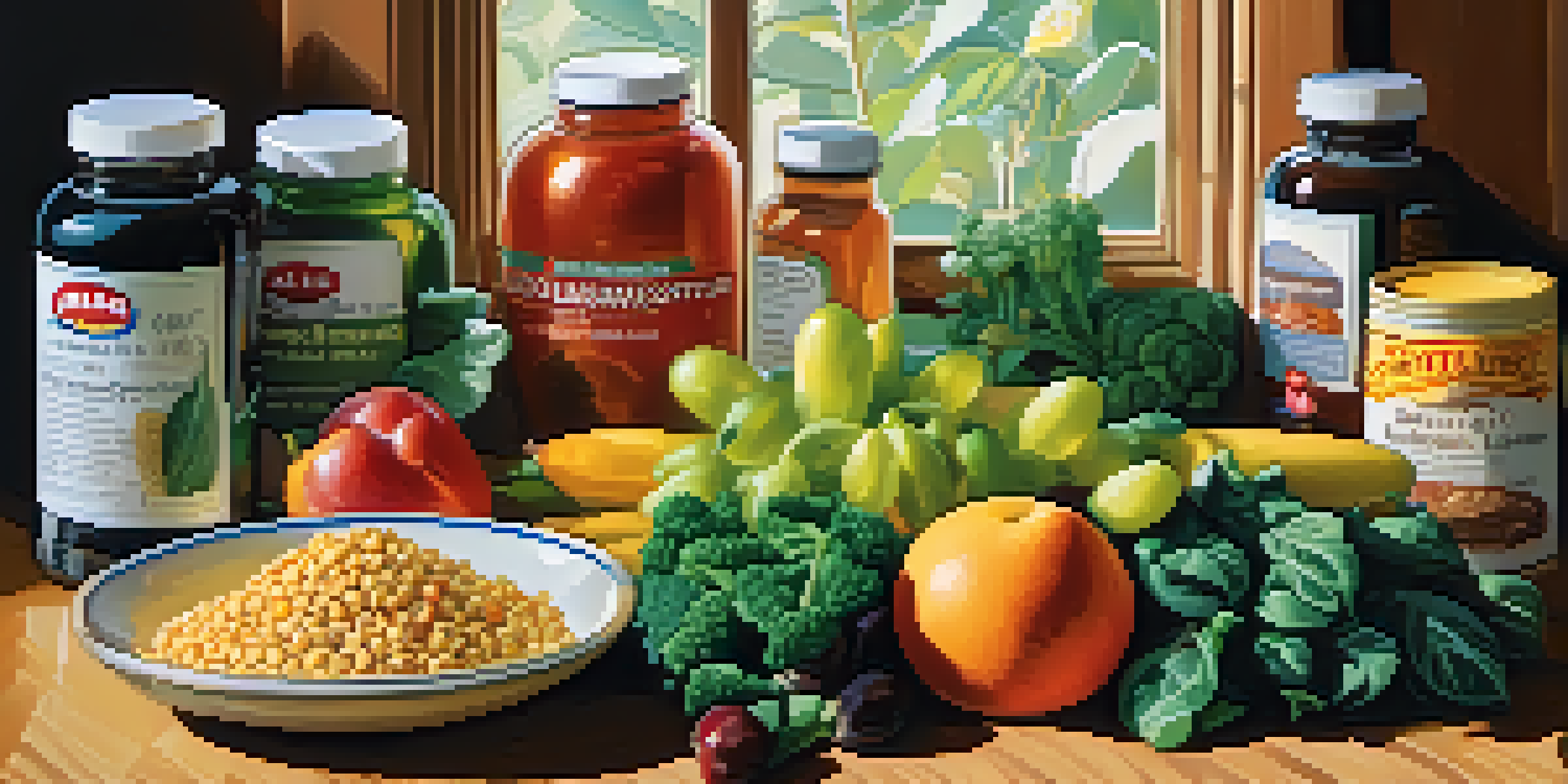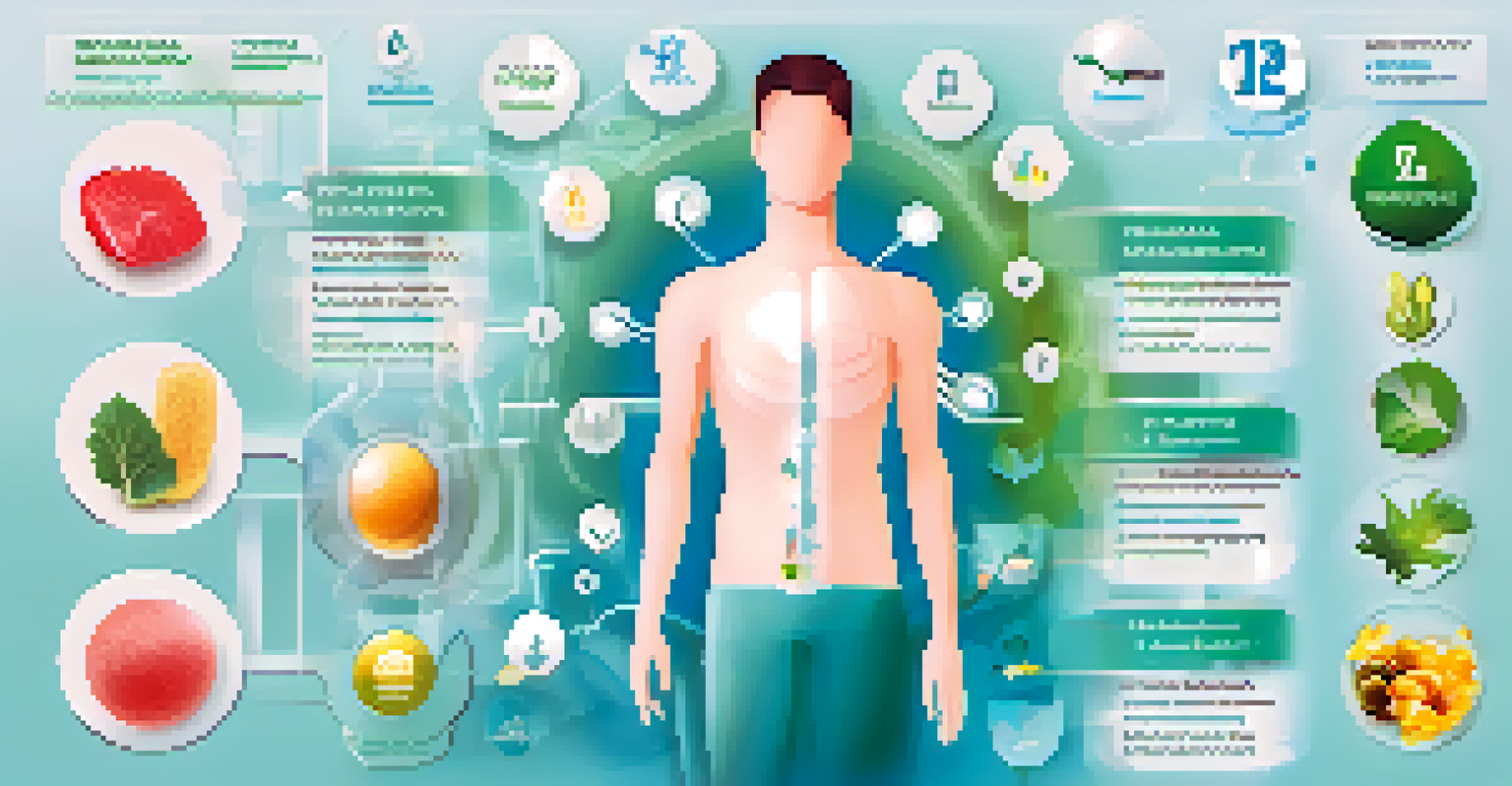The Vitamin B12 Challenge for Vegetarians: Myth or Fact?

Understanding Vitamin B12: The Essential Nutrient
Vitamin B12, also known as cobalamin, is crucial for our health. It plays a significant role in the production of red blood cells and helps maintain the healthy functioning of our nervous system. Without adequate B12, individuals risk developing anemia and neurological issues.
You can’t just eat a salad and think you’re healthy. You’ve got to be aware of what you’re missing.
This vitamin is primarily found in animal products such as meat, fish, dairy, and eggs. For vegetarians, who often cut out these food sources, obtaining sufficient B12 can be a challenge. Thus, understanding the implications of a vegetarian diet on B12 levels is vital.
Many people are unaware that B12 deficiency can lead to fatigue and weakness. This makes it essential for vegetarians to explore alternative sources or supplements to meet their nutritional needs.
The Vegetarian Diet: A Closer Look
Vegetarianism is a popular lifestyle choice, often adopted for health, ethical, or environmental reasons. While a vegetarian diet can be rich in fruits, vegetables, grains, and legumes, it may lack certain nutrients, including Vitamin B12. This raises the question: do vegetarians really face a B12 challenge?

Incorporating a variety of plant-based foods can offer many benefits, but B12 isn’t naturally found in most of them. Some fortified foods, such as plant milks and breakfast cereals, can provide the needed B12, but not all vegetarians consume these options regularly.
Vitamin B12 is vital for health
Vitamin B12 is essential for red blood cell production and nervous system function, and deficiency can lead to serious health issues.
This is where awareness becomes crucial. Many vegetarians might unknowingly risk deficiency, making it essential to educate themselves about their dietary choices and the potential gaps in their nutrition.
Myth or Fact: Can Vegetarians Get Enough B12?
The claim that vegetarians cannot get enough Vitamin B12 is often debated. While it’s true that those who strictly avoid all animal products may face challenges, many vegetarians can maintain adequate levels with careful planning. This often involves incorporating fortified foods or supplements into their diets.
The vegetarian diet is the most important thing you can do for your health, but it needs to be done right.
However, it's important to note that individual needs can vary. Factors such as age, health status, and lifestyle choices can influence how much B12 one requires. Therefore, blanket statements about vegetarian diets can be misleading.
Ultimately, the key is to remain informed and proactive about dietary choices. With the right resources and knowledge, many vegetarians successfully meet their B12 needs.
Symptoms of B12 Deficiency: What to Watch For
Recognizing the symptoms of Vitamin B12 deficiency is essential for vegetarians. Common signs include fatigue, weakness, and pale skin, but more serious symptoms can also occur, such as numbness or tingling in the hands and feet. These symptoms can significantly impact daily life and overall well-being.
Some individuals may also experience mood changes, cognitive difficulties, or even memory loss as a result of B12 deficiency. This highlights the importance of monitoring one’s health, especially for those following a vegetarian diet.
Vegetarians face B12 challenges
Due to the lack of natural B12 sources in a vegetarian diet, individuals must be proactive in choosing fortified foods or supplements.
If you notice any of these symptoms, it’s advisable to consult a healthcare professional. They can provide guidance on testing and treatment options to ensure you’re getting enough of this essential vitamin.
Testing for B12 Deficiency: A Simple Process
Testing for Vitamin B12 deficiency is relatively straightforward and can be done through simple blood tests. These tests measure the level of B12 in your bloodstream, giving you a clear picture of your nutritional status. If you're a vegetarian or suspect you might be deficient, it's a good idea to discuss testing with your doctor.
Understanding your levels can help you make informed dietary choices. If a deficiency is detected, your healthcare provider can suggest dietary adjustments or recommend supplements to help replenish your B12 stores.
Regular testing is particularly important for vegetarians, as they may not always recognize signs of deficiency until it becomes severe. Staying proactive about your health can make a world of difference.
How to Boost B12 Intake as a Vegetarian
For vegetarians looking to increase their Vitamin B12 intake, there are several effective strategies. One of the simplest ways is to include fortified foods in your diet. Many plant-based milk alternatives, breakfast cereals, and nutritional yeast are now enriched with B12, making them excellent choices.
In addition to fortified foods, B12 supplements are widely available and can be a convenient option for those who struggle to meet their needs through diet alone. Consulting a healthcare professional can help determine the right type and dosage for your individual needs.
Monitor B12 levels regularly
Regular testing for Vitamin B12 deficiency is crucial for vegetarians to ensure they are meeting their nutritional needs.
By being mindful of your B12 sources, you can enjoy a balanced vegetarian diet while ensuring your body gets the nutrients it requires.
Conclusion: Navigating the B12 Landscape as a Vegetarian
In conclusion, the Vitamin B12 challenge for vegetarians is not merely a myth, but a reality that requires attention and understanding. By recognizing the potential for deficiency and taking proactive measures, vegetarians can successfully navigate their dietary choices. Awareness and education are key components in this journey.
It’s essential to stay informed about your nutritional needs and to seek guidance when necessary. With the right strategies in place, a vegetarian diet can be both fulfilling and nutritionally adequate.

Ultimately, embracing a vegetarian lifestyle doesn't have to come at the expense of your health. With a little effort and planning, achieving optimal B12 levels is within reach.